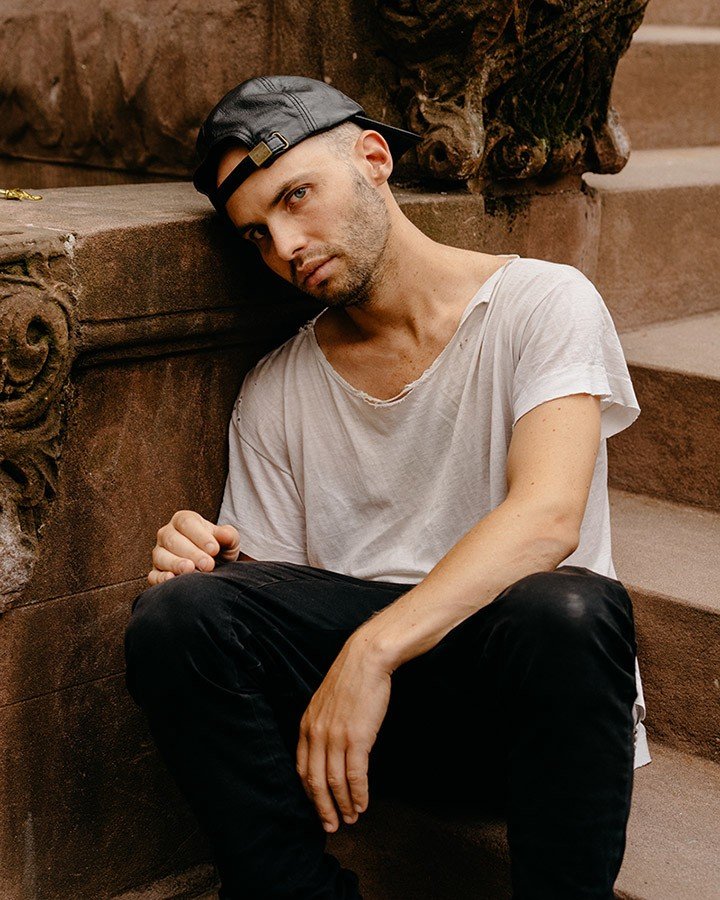Few people can stretch the bounds of pop music the way Autre Ne Veut, a.k.a. Arthur Ashin, does. His is the kind of music that makes you want to tilt your head towards the sky and belt the lyrics at the top of your lungs. Arthur has a style of singing that makes you think you can sing, even if you can't. Combine the power of his voice with a background studying avant-garde music, a current focus on free jazz, an acute sense of our social media-obsessed culture and you have one of the most promising album's of the year, Age of Transparency.
On the day I speak with Arthur he's very calm but expresses that he's feeling the pressure of the moment. It's two days before the release of his most challenging album to date, and nine days before he sets out on tour. "It's just a lot at one time. That's all of life (right now)...it's a blessing and a curse," he says.
In a day where many see the lack of transparency in people's social media performances, Age of Transparency feels like a burst of light coming to wreck our social media-wired conscious. Every album Ashin has created, confidently breaks through the mundane surface of what's expected, but with an entire album dedicated to our society's current state of mind he's hit his strongest nerve ever.
"It's like we're trapped, like we've all been tricked into behaving this way," says Ashin as we discuss the guise of transparency social media provides. "Social media isn't the problem," he goes on to say. "That's like calling a telephone or a television a problem. Yeah, (social media) introduces new problems, but it isn't in of itself the problem. It's symptomatic of a very scary, indestructible capitalist system that we're all impacted by.
You can find a little corner of the world to not participate actively. Plenty of people have tried to escape culture, but the fact that you have to search that far is proof that capitalism is the only real culture that impacts everyone at this point. It's not a malicious capitalism per se, but its only agenda is that it continues to grow. We are in the matrix, and we're the batteries that feed this weird capitalist machine." Arthur laughs and says, "You caught me in a particularly nihilistic mood."
All of these poignant feelings from Arthur have been translated into his latest work, an album that's allowed him opportunities he's never had until now.
MP: So this is basically your fourth album, and you've found a new label for each release. How was it working with Downtown for Age of Transparency?
ANV: Downtown's been terrific. They let me make, what is in my opinion, my weirdest record yet. They put me into a studio with jazz players and I got to record them. You can tell from the get go that's not going to have a lot of marketability. It's like, let's just get in the studio and we're going to have Ornette Coleman just pop off *laughs*. But that's what happened, and they made some really absurd dreams come true.
MP: You open this album with a massacred version of your pop/dance song, "On and On", that you originally created for Adult Swim's 2013 singles collection. Why did you choose to open the album with such a difficult song?
ANV: The original song was written and produced in about 72 hours. I was on tour at the time and Adult Swim has only put out really amazing music so it seemed like a cool opportunity. I didn't think I was going to pull it off but it came together. I think the idea for the melody was great, but I just started thinking, how can this song be more interesting to me? I just kept going back to this idea of Alice Coltrane-continuous-music thing. She plays harp on her records and there's this continuos flow of notes. That framework felt really exciting and beautiful to me. I started working on an arrangement that functioned in that capacity, and as I was putting the record together, I knew that part of the principle of production for the record was that I'd make this beautiful thing and tear it apart. "On and On" was the easiest of the tracks to access in that way because it was the least formally structured. It was like painting. I'd create a weird pitch dip or speed things up and throw a weird effects section on it. It ended up symbolizing to me the way that I'd be using this disruptive cultural technology throughout the record, and it seemed to be the best introduction to the record for that technology. I wouldn't be surprised if 90% of the people who love this record end up skipping that song every time. It makes sense, but it's important for me to set the stage and let people know what I'm thinking musically.
MP: How would you describe your music?
ANV: PBRnB...I'm joking. That's not my job, you know what I mean? I've tried to come up with different names. The first one I was really attached to was failure-pop and that didn't really get picked up. I was hoping to create a micro-hype genre, but I'm not the first. Ariel Pink was also making failure-pop or whatever. Throughout history there's been great examples of canonical failure-pop. Marvin Gaye's last record, aside from "Sexual Healing", is this really weird exploration of him just riffing over drum machines, and it's great. It's also his top selling record, but it's very weird. It's like the first time he's using drum machines and synthesizers in a serious way and he's out of his element because he's come up through a very different way of making music. Whenever there's a transitional phase where new technology is being introduced, you're going to get these bizarre explorations of that technology that don't end up fitting the tropes and usages that end up becoming the signifiers for it later on.
You end up with these records that feel like they exist outside of time and space, not because they're bad, but because they fail to predict the future almost. I was trying to make that sort of pick up, but apparently I don't have that sort of cultural credibility. My latest one is American music but that's a really dark tongue-in-cheek thing to say because music in America is the history of cultural appropriation, and my music does not transcend that problem in any way shape or form.
MP: You mentioned in a recent interview that music no longer feels impossible to you and that you don't love it like you used to. What is it about music that's lost it's sense of magic for you?
ANV: The more you learn about engineering and the aspects of making music, the more you start thinking about that stuff when you listen to other people's music, especially contemporaries. I don't want to name any names, because I don't want to be wrong, or say anything disparaging about other people who are trying just as hard as I am to make (a music career) work, which is a crazy decision in life. But, you instantly recognize all these sounds and exactly how they were made. It's interesting how demystifying knowing too much about the technology behind music can be.
Sometimes a band just sounds like a 2015 version of another band. Pastiche has been popular for like 20 years now, and I find it kind of tiresome. Nobody's like, let's just do our own thing. It's not cool to do a new thing most of the time. Most bands try and do something that works, and make it better, which is smart if you're going to try and be a career musician. Our brains have been acculturated to like certain stuff. It's just harder for me to find new music that blows me away and I'm like, I've never thought of that before. That's what excites me about records, that or the songwriting is impeccable. Like my friends in the band, Majical Cloudz, have created just beautiful, canonical singer/songwriter music. They're just well written songs that I want to listen to over and over again because they make me feel something. Either music does something novel and blows me away or it comforts me in some deep songwriter level. It's harder for me to find that because I've heard so much.
MP: Is it corny to be a musician in this day and age?
ANV: Corny? It's always been corny. It's dumber than it's ever been because it's harder to sustain yourself. I never thought I was going to be a musician. I have the capacity to do other things, like work a normal job. I just kept avoiding the idea to be a musician, and at some point I just really couldn't do anything else. I don't have to do it for the rest of my life, but I have to have done it. You know, give it the ol' college try or whatever. I only think you should do it if it's the only thing you can do. There's literally no money in it and the money you make, at least for me, comes at different degrees of ethical compromise. Yeah, being a musician is goofy.
MP: What's been the greatest influence on your vocal style?
ANV: Patti LaBelle live is unbelievable. She has this incredible gremlin character that she goes into, which I find very inspiring. She has these wailing moments near the end of a song where she just let's loose and it's super unreal. Al Green and Otis Redding too. It's mostly the soul singers that push themselves to allow themselves to be ugly. Growing up I was really inspired by that stuff. There's this Canadian band, Lime. I'm not a huge fan of their work in general, but they have this one song called, "Babe We're Gonna Love Tonight". It's a husband/wife duo and the way that their voices work on that song, actually inspired me to say, alright I'm going to do this new project where I'm a singer in this way. Neither of the vocalists sound "good" but it's a jam. I realized you can just sing your heart out, and not sound so good, but the music still works.
MP: With all of the R&B, Soul and Jazz that you like, you seem to keep things harsh, especially on this album. Where does that tension come from?
ANV: This project in particular came up though the noise world in Brooklyn. It was the era of the Behringer mixer and relatively inexpensive 80s analog synths. A lot of kids had this mixer that they would create feedback with and then they would play a synthesizer along with it. I'm kind of ear-trained that way. I took this class in college that was like bootcamp for avant-garde music practices. You learn about turntabilism and classical minimalism and then we'd have these six hour long listening sessions with minimal techno. I was always just excited about the different possibilities of what music could be and what could be construed as music. But more as a creator than a listener, because when I have time to listen to records and chill out, I really like listening to folk music. I love pop music too. I always want my music to work on some kind of body level. It's about trying to find a balance between disrupting something that works and letting something work.










